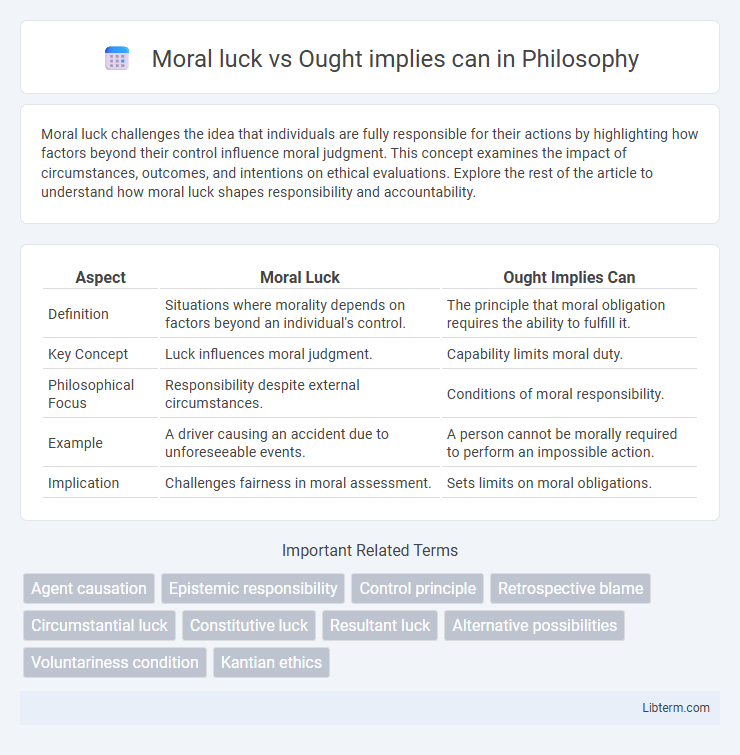Moral luck challenges the idea that individuals are fully responsible for their actions by highlighting how factors beyond their control influence moral judgment. This concept examines the impact of circumstances, outcomes, and intentions on ethical evaluations. Explore the rest of the article to understand how moral luck shapes responsibility and accountability.
Table of Comparison
| Aspect | Moral Luck | Ought Implies Can |
|---|---|---|
| Definition | Situations where morality depends on factors beyond an individual's control. | The principle that moral obligation requires the ability to fulfill it. |
| Key Concept | Luck influences moral judgment. | Capability limits moral duty. |
| Philosophical Focus | Responsibility despite external circumstances. | Conditions of moral responsibility. |
| Example | A driver causing an accident due to unforeseeable events. | A person cannot be morally required to perform an impossible action. |
| Implication | Challenges fairness in moral assessment. | Sets limits on moral obligations. |
Introduction to Moral Luck and Ought Implies Can
Moral luck challenges the principle of "Ought implies can" by questioning whether individuals can be morally judged for actions beyond their control. The principle "Ought implies can" asserts that moral responsibility requires the ability to act otherwise, grounding ethical obligations in one's capacity to choose. This tension highlights debates in moral philosophy about accountability when outcomes depend on luck versus the agent's capability to fulfill moral duties.
Defining Moral Luck: Types and Examples
Moral luck refers to situations where the morality of an action is influenced by factors beyond the agent's control, challenging the principle of "Ought implies can," which asserts moral responsibility only where action is possible. Types of moral luck include resultant luck, where consequences affect moral judgment; circumstantial luck, determined by the situation one faces; and constitutive luck, relating to inherent traits. For example, two drivers may exhibit identical negligence, but only the one causing harm faces moral blame due to resultant luck.
Understanding the Principle: Ought Implies Can
The principle "Ought implies can" asserts that moral obligation depends on the ability to perform the obligated action, highlighting that one cannot be morally required to do what is impossible. Moral luck challenges this by suggesting that factors beyond one's control influence moral judgment, complicating the clear boundary set by the principle. Understanding this tension clarifies how responsibility and blame are assessed when external circumstances affect an agent's capacity to meet moral demands.
The Tension Between Moral Luck and Moral Responsibility
Moral luck challenges the principle of "Ought implies can" by presenting cases where individuals are judged morally despite factors beyond their control, creating tension with the notion that moral responsibility requires the ability to act otherwise. The unpredictability of circumstances influencing outcomes complicates the assignment of praise or blame, undermining a pure interpretation of moral agency tied to capability. This tension questions the coherence of holding agents fully accountable when external forces significantly shape moral outcomes.
Historical Perspectives on Moral Luck
Historical perspectives on moral luck reveal debates surrounding its challenge to the principle "ought implies can," which holds that moral obligation depends on the ability to act. Philosophers like Thomas Nagel and Bernard Williams highlight how outcomes beyond an agent's control affect moral judgment, complicating traditional views on responsibility. This tension illustrates shifting interpretations of moral accountability through history, emphasizing external factors in ethical evaluation.
Criticisms and Challenges to Ought Implies Can
Critics argue that the principle "Ought implies can" oversimplifies moral responsibility by ignoring scenarios where individuals face unavoidable constraints, thus challenging its universality. Philosophers highlight cases of moral luck, where outcomes beyond an agent's control influence moral judgment, undermining the direct link between moral obligation and ability. This tension reveals difficulties in applying "Ought implies can" consistently in complex ethical situations involving uncontrollable factors.
Case Studies: Real-World Examples of Moral Luck
Case studies of moral luck reveal how unpredictable factors influence moral judgment beyond an agent's control, exemplified by two drivers exhibiting identical reckless behavior but differing outcomes, where only the one causing harm faces moral condemnation. Real-world examples, such as the contrasting fates of two doctors performing risky surgery with identical protocols but differing patient results, highlight the complexity of assessing moral responsibility. These instances challenge the principle of "ought implies can," demonstrating that moral evaluations often depend on luck rather than solely on an agent's capacities and intentions.
Philosophical Debates: Reconciliations and Contradictions
Moral luck challenges the principle of "ought implies can" by suggesting that individuals are judged morally despite factors beyond their control, creating tension in ethical theory. Philosophers debate whether moral responsibility should be contingent solely on an agent's capacity or influenced by luck-induced outcomes, reflecting core contradictions in normative ethics. Attempts at reconciliation explore redefining moral responsibility to accommodate both constraints of agency and uncontrollable circumstances within moral evaluation.
Implications for Ethics and Decision-Making
Moral luck challenges the principle of "ought implies can" by suggesting individuals may be judged for actions influenced by factors beyond their control, complicating the attribution of moral responsibility. This tension influences ethical theories by questioning whether moral obligation depends solely on an agent's capabilities or also on external circumstances. Decision-making processes in ethics must then account for unpredictability and uncontrollable variables while maintaining accountability standards.
Conclusion: Navigating Moral Luck and Ought Implies Can
Moral luck challenges the principle of "ought implies can" by revealing how factors beyond an agent's control influence moral responsibility. Despite uncontrollable circumstances affecting outcomes, ethical frameworks must balance accountability with an individual's genuine capacity to act. Navigating these tensions requires nuanced judgments that respect both the limits of agency and the demands of moral obligation.
Moral luck Infographic

 libterm.com
libterm.com